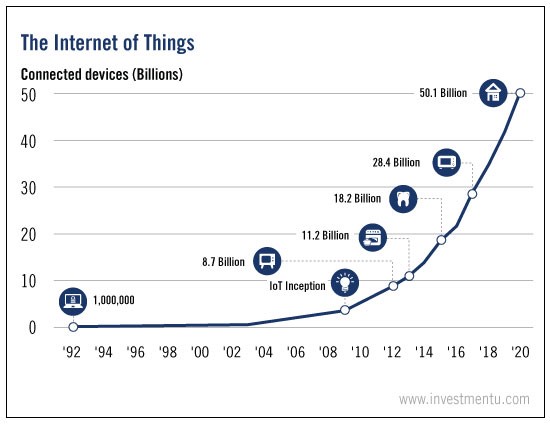It’s one of the vaguest terms in the tech industry. (Perhaps rivaled only by “the cloud.”) You may or may not know what it means. But hopefully you do know that it’s worth billions of dollars.
We’re talking about the Internet of Things (IoT).
In this article, we’re breaking down the basic concept of IoT and some of its most valuable applications. To start, a simple IoT definition from Gartner:
The Internet of Things is the network of physical objects that contain embedded technology to communicate and sense or interact with their internal states or the external environment.
In other words, IoT refers to everyday technologies - outside of smartphones and computers - that use an internet connection. Think web-enabled features in buildings (smart thermometers, appliances, etc.) and vehicles (automated crash reporting, self-driving capabilities).
The big idea is to enable all kinds of machines to talk to each other through the internet.

If that definition still seems too fuzzy, don’t worry. Here are some specific examples of how the IoT concept is being put to use - and how you can invest.
Smart Homes and Businesses
Perhaps the best-known IoT application is connecting different features of buildings. An IoT-integrated house is called a “smart home.” For example, you might program your HVAC system to adjust based on an internet feed of the weather outside.
That’s the idea behind Nest Labs, a former startup that was recently acquired by Alphabet (NASDAQ:GOOGL). Nest came to market with a thermostat which combines weather data with user-specified preferences. This allows it to regulate home temperature automatically.
The company is also behind the popular Nest Cam and Nest Protect. The former provides a real-time security feed via smartphone. And Nest Protect not only alerts you if there’s smoke or a carbon monoxide leak, but it also lets you know the specific room where there’s trouble.
Smarter Cars
If you’re friends with a mechanic - or you are one yourself - then you understand that cars are miraculously complicated machines. The IoT is making those systems safer... and much more efficient.
IoT-connected cars can automatically run sophisticated diagnostics on themselves. They can tighten up brake systems when they sense icy conditions ahead. And one day in the not-so-distant future, they’ll be able to drive themselves.
The biggest proponent of IoT-enabled cars is Tesla (NASDAQ:TSLA). The electric car pioneer has already included some IoT features in its latest models. For example, a recent Tesla recall didn’t require drivers to find a dealership...
They just had to download a software update.
City Planning and Management
Cities are another complicated web of interlocked systems. That’s why city governments are so excited about the IoT.
Web-connected infrastructure could improve safety monitoring of bridges and streetlights. It can also create smarter traffic lights and public transit by syncing parts of these systems through the internet.
Cisco Systems Inc (NASDAQ:CSCO) has been one of the biggest IoT advocates. It’s leading the research and development push for public-sector applications of the technology. In recent years, it has rolled out products to improve public Wi-Fi access and create more efficient city lighting systems.
Over the years, the tech sector has been a tremendous source of growth for investors. To succeed here, you’ve got to have at least some notion of how the latest doohickeys work. In fact, we’d argue that’s doubly important when investing in the Internet of Things.
Because as the IoT expands, it will connect all of the doohickeys.
